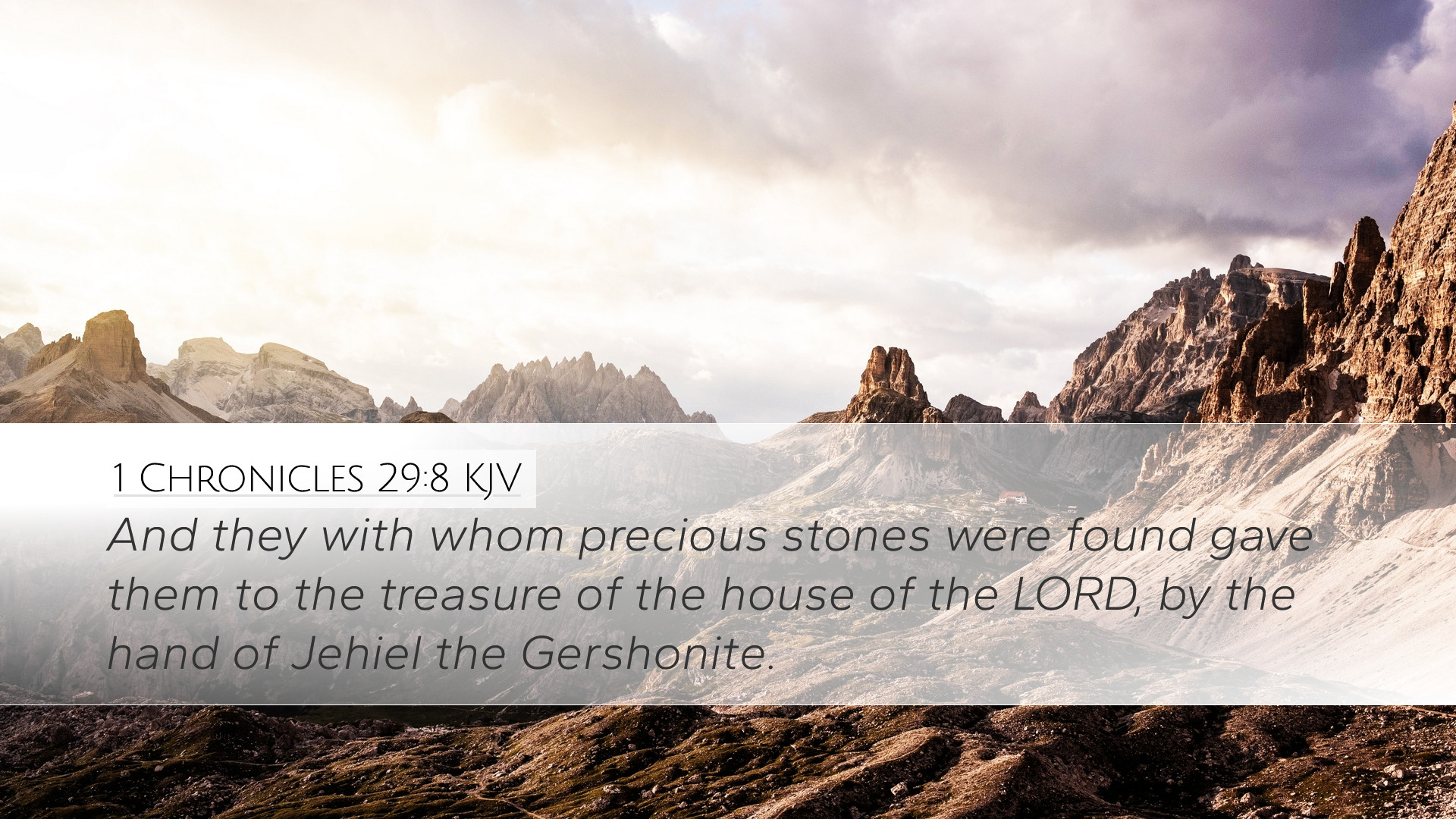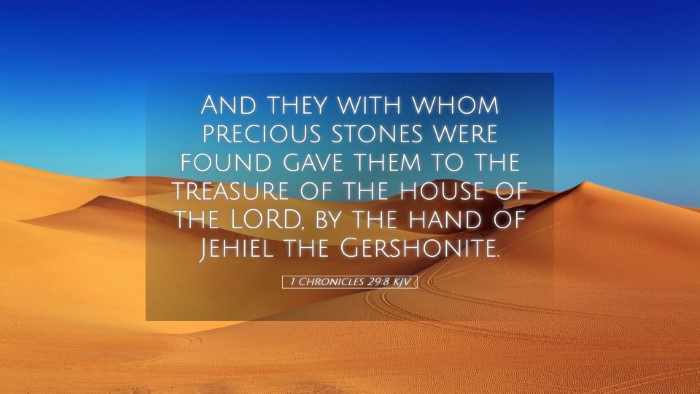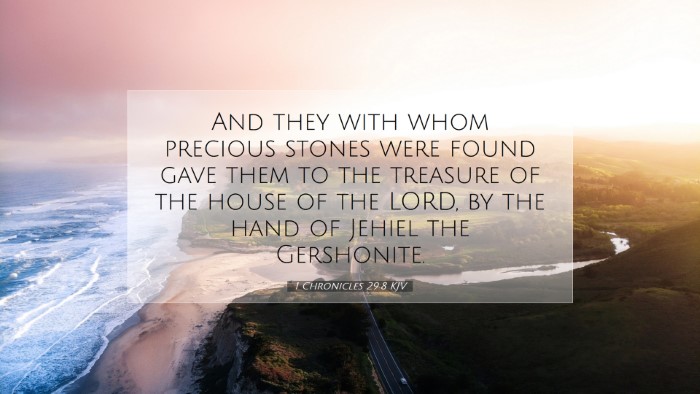Commentary on 1 Chronicles 29:8
Bible Verse: 1 Chronicles 29:8 (KJV) - "And they with whom precious stones were found gave them to the treasure of the house of the LORD, by the hand of Jehiel the Gershonite."
Introduction
This verse captures a significant moment in the history of Israel, emphasizing the dedication of treasures for the house of the Lord during the preparations for the temple. It reflects the communal spirit of giving among the Israelites and the importance of utilizing resources for divine purposes. In this commentary, we will explore various insights provided by esteemed biblical scholars such as Matthew Henry, Albert Barnes, and Adam Clarke.
Contextual Overview
Before delving into the verse itself, it is imperative to understand its context within the broader narrative of 1 Chronicles. This book aims to recount the history of Israel with an emphasis on worship, David's reign, and the eventual construction of the temple.
The Significance of the Context
- Historical Setting: 1 Chronicles is part of the Chronicler's history, focusing on the religious aspects of Israel's past.
- Preparations for the Temple: This chapter marks the culmination of David’s lifelong desire to build a temple, emphasizing a transition from a nomadic worship style to a settled, communal worship in a dedicated space.
Analysis of 1 Chronicles 29:8
In this verse, we observe the willing offerings made by the people of Israel, indicating a heartfelt response to the call for resources to construct the temple. It not only highlights their generosity but also the communal effort in worship and dedication to God.
Insights from Commentaries
- Matthew Henry:
Henry emphasizes the collective nature of this act of giving. He notes that the gifts contributed were not just material, but also represented the hearts and devotion of the people towards God’s house. He perceives this moment as a powerful testimony of unity and commitment within the community to glorify God through material sacrifice. Henry stresses the importance of the heart in giving, indicating that true offerings to God stem from a willing spirit.
- Albert Barnes:
Barnes focuses on the practical aspects of this verse, noting how Jehiel the Gershonite served as a custodian of these precious resources. He comments on the role of leadership in encouraging such acts of generosity and the establishment of dedicated individuals who facilitated the temple preparations. Barnes highlights that the giving of precious stones is symbolic of the value placed on the building of the temple. It represents a willingness to invest not just materially but spiritually in God’s work.
- Adam Clarke:
Clarke provides a detailed examination of the significance of the “precious stones” mentioned in the verse. He posits that these stones are indicative of God’s glory and majesty, reflecting the beauty and holiness of the temple that was to be built. Clarke also emphasizes the historical integrity of these donations and their alignment with God’s purpose for Israel. His commentary highlights the notion that every gift, no matter its material worth, should be given in sincerity and joy.
Theological Implications
This verse serves as a profound theological reflection on stewardship and the nature of giving in the Christian faith. It illustrates several key principles:
- The Call to Generosity: The willingness of the Israelites to donate precious materials speaks to the biblical call for generosity. In the New Testament, this is echoed in 2 Corinthians 9:7, where believers are called to give cheerfully.
- The Importance of Community Worship: The collaborative effort in building the temple underscores the idea that worship is not solely an individual endeavor, but a communal responsibility and privilege.
- Investing in God’s Kingdom: The act of giving to the temple can be seen as an investment in future generations, reinforcing the principle of legacy and commitment to God’s work that lasts beyond one’s own lifetime.
Practical Applications for Pastors and Theologians
Pastors and church leaders can draw several lessons from this verse to guide their congregations in a deeper understanding of giving:
- Encouraging Generosity: Teach the congregation about the importance of generous giving, not just in terms of resources, but also in time and talent for church activities.
- Celebrating Community Efforts: Highlight stories within the community that demonstrate collective efforts, reinforcing the idea that the church is stronger when members work together towards a common goal.
- Fostering a Spirit of Worship: Encourage a mindset that recognizes giving as an act of worship, where the attitude behind the gift matters just as much as the gift itself.
Conclusion
1 Chronicles 29:8 provides a rich tapestry of insight into the themes of giving, community, and worship. As derived from the works of respected commentators, we find a clarion call to pour our hearts into the investment of God’s kingdom through our resources and relationships. The act of giving serves both as a reflection of our inner devotion as well as a substantial contribution to the communal expression of faith. In nurturing this understanding, we faithfully act as stewards of God’s blessings, fostering a culture of generosity in our congregations.


